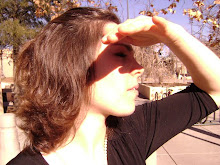The truth is, my heart is broken. May I sing "Will I lose my dignity? will someone care? Will I wake tomorrow from this nightmare?" and then watch others forfeit their dignity before my eyes and not feel heartbroken? The bell tolls for me, too- theirs is my pain and my loss. I mean theatre. Something so simple, so un-important ("oh, is that all?") yes? But not. In it, as in all poesy, is life... and I feel we have lost sight of the -dignity we even might have- that we even might wish to have. Why should I not feel heartbroken?
To say what I really mean, I turn to Sir Philip Sidney.
"Only this much is now to be said, that the comedy is the imitation of the common errors of our life, which he (comedy) representeth in the most ridiculous and scornful sort that may be, so as it is impossible that any beholder can be content to be such a one. Now, as in geometry the oblique must be known as well as the right, and in arithmetic the odd as well as the even, so in the actions of our life who seeth not the filthiness of evil wanteth (lacks) a great foil* to perceive the beauty of virtue...whereto yet nothing can more open his eyes than to find his own actions contemptibly set forth." (Though, of course, to truly succeed in comedy, the "poets" creating it must understand this as the the aim of their work- and not merely enjoy the baseness of they mirror they hold, which due to lack of any true understanding, is devoid even any actual or intentionally-placed roots of applicability to the viewer!) ..."But our comedians think there is no delight without laughter; which is very wrong...for delight we scarcely do but in things that have a conveniencey(agreement, correspondence) to ourselves or to the general nature.... I speak to this purpose, that in the end of all the comical part be not upon such scornful matters as stir laughter only, but, mixed with it, that delightful teaching which is the end (aim, purpose, goal) of poesy. And the great fault even in that point of laughter...is that they stir laughter in sinful things, which are rather execrable (wretched) than ridiculous, or in miserable, which are rather to be pitied than scorned." (From The Defense of Poesy)
foil: a character who, through contrast, emphasizes the characteristics of another character.
I chose this picture for the Beauty it reminds me of. Images, realities like this, are gifts of clarity to remind of the passion, beauty, and dignity, and potential of our lives ~

"History will have to record that the greatest tragedy of this period of social transition was not the strident clamor of the bad people, but the appalling silence of the good people."
-Martin Luther King, Jr.
"Nothing in all the world is more dangerous than sincere ignorance and conscientious stupidity."
- Martin Luther King, Jr.

No comments:
Post a Comment